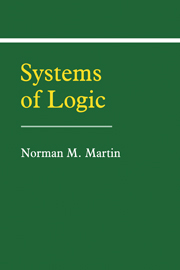Book contents
- Frontmatter
- Contents
- Preface
- 1 Formal Systems and Structure Theory
- 2 Zero-Order Logic: Proof Theory
- 3 Zero-Order Model Theory
- 4 Positive Implication
- 5 Negation
- 6 Complete Implication-Negation Logic
- 7 Disjunction
- 8 Conjunction
- 9 Multi-Connective Systems
- 10 Strict Implications: Introduction
- 11 Strict Implications: Additional Results
- 12 Quantification and First-Order Logic
- 13 Quantification and Complete Logics
- 14 Quantification and Incomplete Logics
- 15 Interpretation of Formal Systems
- Appendix: Historical and Bibliographical Remarks
- Subject Index
- Index of Systems
- Index of Symbols
Appendix: Historical and Bibliographical Remarks
Published online by Cambridge University Press: 12 March 2010
- Frontmatter
- Contents
- Preface
- 1 Formal Systems and Structure Theory
- 2 Zero-Order Logic: Proof Theory
- 3 Zero-Order Model Theory
- 4 Positive Implication
- 5 Negation
- 6 Complete Implication-Negation Logic
- 7 Disjunction
- 8 Conjunction
- 9 Multi-Connective Systems
- 10 Strict Implications: Introduction
- 11 Strict Implications: Additional Results
- 12 Quantification and First-Order Logic
- 13 Quantification and Complete Logics
- 14 Quantification and Incomplete Logics
- 15 Interpretation of Formal Systems
- Appendix: Historical and Bibliographical Remarks
- Subject Index
- Index of Systems
- Index of Symbols
Summary
Historical Notes
The purpose of this section is to satisfy the historical interests of the reader and, as far as I am able, to discharge the obligations of academic honesty.
Before entering into the details, I would like to point out that more of my ideas than I am able to trace are due to the influence of my teachers of logic: Rudolf Carnap, Evert W. Beth, Arend Heyting, and Stephen C. Kleene, to whom I must add, primarily through their writings, Alonzo Church and Alfred Tarski. The influence of these teachers on my thinking is so pervasive that the tracing of any idea of mine to one or more of them would never surprise me.
With regard to more specific indebtedness:
Chapters 1-2: The modern concept of logical calculus on which these definitions rest is primarily due to Gottlob Frege and to a lesser degree to David Hilbert, Bert rand Russell, and Charles Saunders Peirce. The formulation of structure and derivation concepts is, I believe, original in its detail, but to a considerable degree, is based on formulations by Church, Rosser, and to a lesser degree, Carnap and Gentzen.
Chapter 3: The greater portion of this chapter is based on the work of E.L Post and J.B. Rosser.
Chapter 4: With few exceptions, the systems in chapters 4 - 9 were determined by a natural architectonic. Most of them had however been independently developed earlier and the following notes indicate the earliest source I have been able to discover.
- Type
- Chapter
- Information
- Systems of Logic , pp. 303 - 314Publisher: Cambridge University PressPrint publication year: 1989



